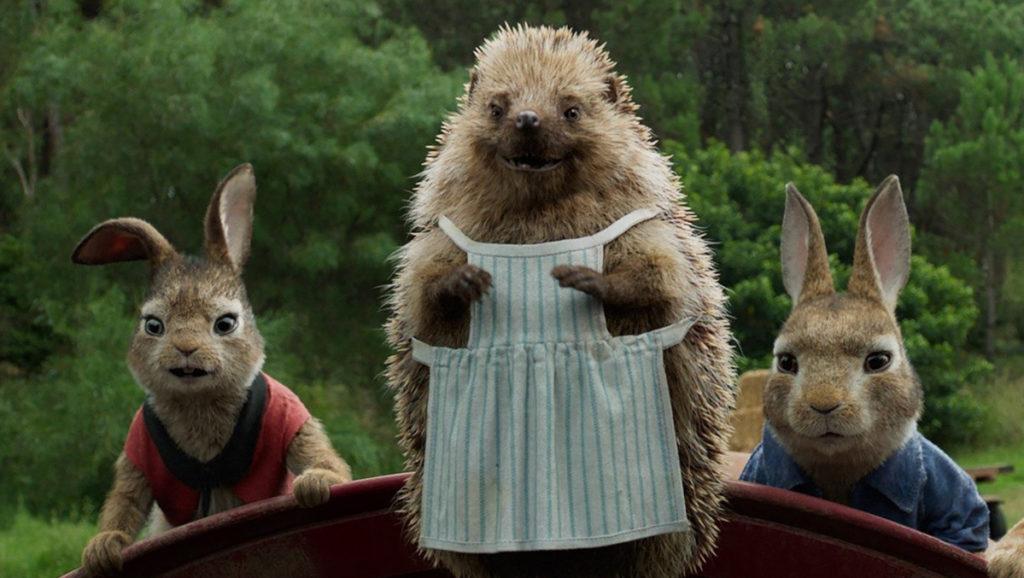A small brown rabbit in a faded blue coat zips through a leafy garden. He’s clutching pawfuls of tomatoes, peppers, zucchini and squash. Other animals dart through the foliage, tossing produce to their friends on the other side of the garden fence. They’re cheering, laughing and singing — it’s a scene of pure jubilation.
That glee and excitement pervade “Peter Rabbit” from the first frame to the finale, but between the moments of triumph are instances of darkness. Characters fail and hurt one another in a very human and real way. “Peter Rabbit” features a degree of nuance usually reserved for Pixar films.
Loosely adapted from Beatrix Potter’s classic children’s stories, “Peter Rabbit” tells the next chapter in Peter Rabbit’s (James Corden) ongoing war with the McGregor family. After the original Mr. McGregor (Sam Neil) keels over and dies, Peter Rabbit and his friends think they’re finally free to steal from the McGregor garden and party in the McGregor mansion. But their celebration is short-lived. Mr. McGregor’s nephew, Thomas (Domhnall Gleeson), inherits the house and renews the assault against the local wildlife.
Peter boasts a brash charisma that toes the line between excessive arrogance and justified ego. He’s clever and able to escape harrowing traps, though more often than not he strutted into the trap in the first place. And yet, despite his wit and charm, Peter is selfish and arrogant. Director Will Gluck doesn’t shy away from Peter’s flaws and acknowledges the reality that a protagonist and a hero are not always the same.
Against all odds, Thomas is the film’s lifeblood. Rather than reduce him to a one-dimensional troll, Gluck opts to give him an arc. While developed characters are the expectation for every film, children’s movies infrequently infuse pathos into their villains. Thomas is far from innocent — he demonstrates a delusional desire for fascistic order — but his character flaws are rooted in past failures and future aspirations. Most refreshing of all, he’s allowed to grow.
The film’s action shares the frenetic confidence of its characters. Peter’s war with Thomas is brutal. The attacks reach various degrees of sadism: rakes to the face, potatoes to the crotch, tomatoes to the head, firecrackers tossed like grenades and doorknobs charged with enough electricity to hurl a grown man across a room. The over-the-top barrage of twisted torture the characters undergo would be off-putting were it not portrayed with lighthearted glee. The attacks follow a cartoon logic, a “Loony Toons” absurdity that makes them feel less violent than they actually are.
But a major moment partway through the film changes the tone of the violence: the blackberry scene. At the height of Peter and Thomas’s war, the rabbit devises a plot to murder Thomas. Peter and his friends take advantage of Thomas’s allergy to blackberries by blasting them into his mouth and sending him into anaphylactic shock.
Many outraged parents and internet commentators view the scene as an endorsement of bullying, but it’s just the opposite. The remainder of the film focuses on Peter’s numerous failings as a character. He is responsible for most of the hardships his family faces, and his repeated assaults on the McGregors have made matters worse, not better. That’s the point of the film, to highlight the reasons why Peter isn’t a hero. Yes, the blackberry scene is unpleasant and violent in a way that’s at odds with the rest of the movie, but it’s crucial to Peter’s character arc. The greatest sin the scene commits is that it’s tonally inconsistent; it’s a moment of real-world violence in a sea of slapstick.
But context is key, and the scenes surrounding the blackberry attack are ignored by critics to promote the false idea that “Peter Rabbit” is a mean-spirited attack on those with allergies. It’s not.
“Peter Rabbit” is infused with anger, jealousy and hatred, emotions that are rarely touched on in children’s cinema. And yes, the film does have a happy ending, but not before its characters are forced to confront complex personal questions. But “Peter Rabbit” doesn’t spoil the humor or ruin its sweet, charming moments. It’s a delicate balance that the film deftly walks. That being said, the film is not a masterpiece. It’s not going to redefine cinema, and it won’t make a lasting noise in the world of young adult entertainment. But it will act as a respite from the bland movies that dominate the animated landscape.
And sometimes, that’s enough.




















